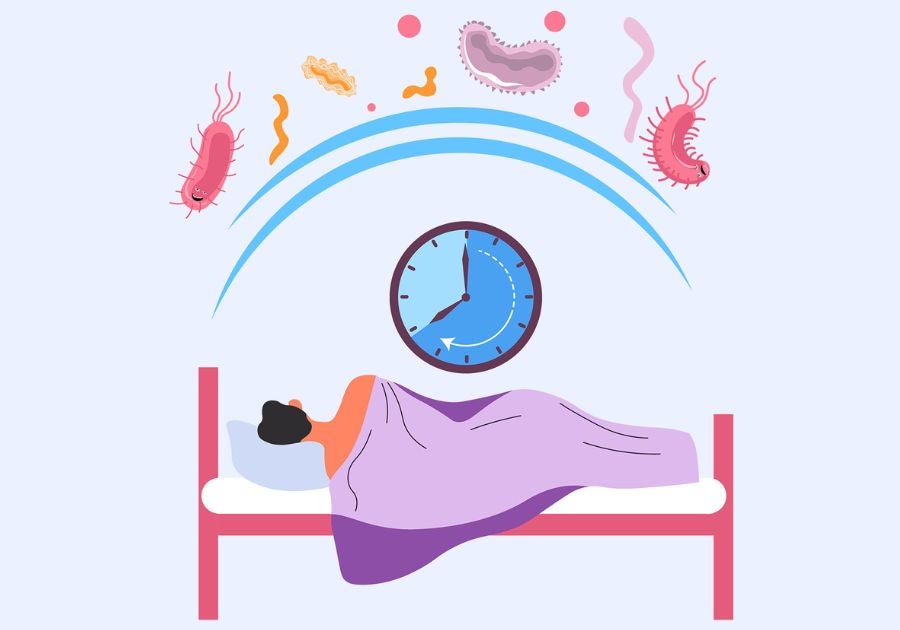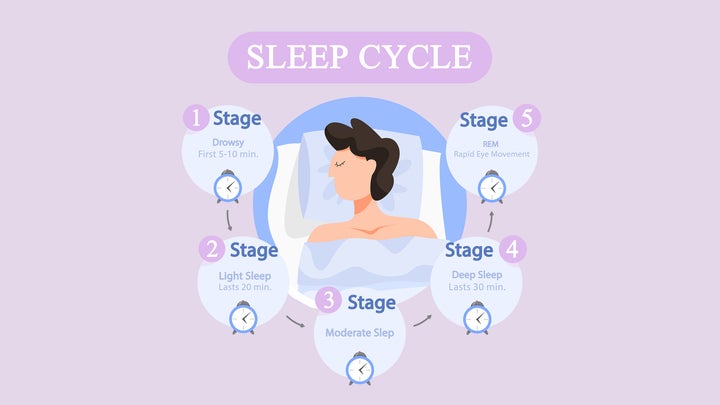Do Your Immune System a Favor, Get More REM Sleep
6 minute read
Last Updated December 19, 2022
6 minute read
Last Updated December 19, 2022

A supported immune system is critical to our overall health and wellness, as it is our body's first defense against everyday threats. Proper rest is essential in maintaining and supporting our immune function.
Deep sleep and the immune system have a bidirectional relationship. Being sleep deprived can lower our immune system while consistent sleep strengthens and balances our immunity and resilience.
There are 5 stages of sleep we cycle through during the night, with two primary stages: light sleep and deep sleep. Stage 1 is a light sleep when we are drifting off for about 10 minutes before we enter stage 2, which is the next phase of the light sleep cycle. The body relaxes, and our brain waves begin to slow down.
Stage 3 is when we enter the essential deep sleep phase and our bodily functions—including the heart rate, brain waves, digestion, and breathing—continue to slow down. While the muscles are relaxing, the body is able to use its energy to perform essential restorative functions that are critical to helping maintain immune health.
These deep sleep activities include the repair of tissues, removing waste, immune system maintenance, consolidating immune memory, and the release of certain hormones, such as melatonin and prolactin, which play a significant role in supporting immune health.
The average person will spend most of their rest in the deep sleep phase; however, the body will necessitate more time in the restorative deep sleep phases if the immune system is triggered and under stress.
It is widely believed that rest, particularly deep sleep, is essential for supporting a healthy immune response. When the immune system is engaged by an external threat, deep sleep initiates an adaptive immune response. This is why deep sleep has been shown to support the immune activities linked with immunization shots.

Finally, we’ll move into the last sleep phase known as REM (rapid eye movement) sleep, where our brain waves and cognitive activity become very active while we are dreaming. This final stage is associated with processing memories and emotions.
Sleep and the immune system have an interdependent relationship that must be kept in balance for our overall health. When your immune system is working to protect against everyday threats, it can create broken sleep patterns and cause a disruption in your sleep quality. Maintaining well balanced and adequate sleep levels are associated with healthy immune function.
When we are well rested, our levels of cortisol, also known as the stress hormone, are balanced, while sleep deprivation shows an unhealthy amount of cortisol. Cortisol in the right amount is a necessary hormone to reduce occasional oxidative stress in the body, which is good, but over time excess cortisol can activate unnecessary immune system responses that can work against your health goals.
Other sleep hormones, such as melatonin, are produced at night and play a role as well. Melatonin is key in helping to maintain a healthy balance of cortisol. During deep sleep, growth hormones and prolactin are released and support healthy levels of the cortisol. These hormonal levels support and promote an adaptive immune response, which is essential for optimal immune support.

Now that we know the essential connection between supporting our immune health and adequate sleep, I want to make sure you’re getting a good night of rest. Here are some ways to make sure you wake up feeling your best:
♦ Go to bed at the same time each night and get up at the same time each morning.
♦ Make sure your bedroom is quiet, dark, relaxing, and at a cool temperature.
♦ Avoid blue light emitting electronic devices such as computers and smartphones before bed.
♦ Avoid large meals, caffeine, and alcohol before bedtime.
♦ Try to be physically active earlier in the day, which can help you fall asleep more easily at night.
Consistent restorative rest every night will help support your immune health and overall wellness. For optimal immune health, a holistic approach that includes supplements like ImmunityMD® are best. The nutrients and clinically-studied ingredients in the ImmunityMD® probiotic formula help support a healthy immune function and whole-body nutrition with ingredients like:
♦ Lactobacillus Rhamnosus: a probiotic shown to promote restoring gut health and supporting the body’s natural defenses
♦ Lactobacillus Acidophilus: a probiotic that promotes digestive and immune system health
♦ Zinc: required to develop and activate T-lymphocytes, promoting immune system strength for overall immune support
♦ L-Lysine: inhibits arginine and alleviates everyday stress
♦ Nutraflora® Prebiotics: a prebiotic designed to nourish probiotic bacteria to ensure potency and efficacy both before and after taking ImmunityMD®
Given the importance of deep restorative sleep for immune health, make it a priority to get enough uninterrupted sleep every night to support your immune function. For optimal immune system health and whole-body nutrition, I recommend being proactive by adding ImmunityMD® to your daily routine. The carefully-selected ingredients will work alongside your restorative sleep routine to promote a healthy immune system for overall health.
Dr. Brian Greenberg

Dr. Brian Greenberg is an immunologist, allergist, and pediatrician who received his medical degree from the University of Florida, and completed his residency and fellowship at UCLA. He has practiced medicine in Southern California for almost 25 years.
Be first in line for major savings, fitness and nutrition tips, health news, and more